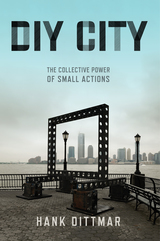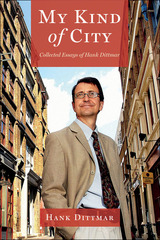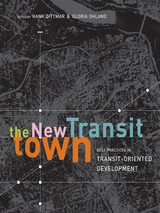
Hank Dittmar, urban planner, friend of artists and creatives, sometime rancher, “high priest of town planning” to the Prince of Wales, believed in letting small things happen. Dittmar concluded that big plans were often the problem. Looking at the global cities of the world, he saw a crisis of success, with gentrification and global capital driving up home prices in some cities, while others decayed for lack of investment.
In DIY City, Dittmar explains why individual initiative, small-scale business, and small development matter, using lively stories from his own experience and examples from recent history, such as the revival of Camden Lock in London and the nascent rebirth of Detroit. DIY City, Dittmar’s last original work, captures the lessons he learned throughout the course of his varied career—from transit-oriented development to Lean Urbanism—that can be replicated to create cities where people can flourish.
DIY City is a timely response to the challenges many cities face today, with a short supply of affordable housing, continued gentrification, and offshore investment. Dittmar’s answer to this crisis is to make Do-It-Yourself the norm rather than the exception by removing the barriers to small-scale building and local business. The message of DIY City can offer hope to anyone who cares about cities.

—Scott Bernstein, Founder and Chief Strategy + Innovation Officer, Center for Neighborhood Technology
Hank Dittmar was a globally recognized urban planner, advocate, and policy advisor. He wrote extensively on a wide range of topics, including architectural criticism, community planning, and transportation policy over his long and storied career.
In My Kind of City, Dittmar has organized his selected writings into ten sections with original introductions. His observations range on scale from local ("My Favorite Street: Seven Dials, Covent Garden, London") to national ("Post Truth Architecture in the Age of Trump") and global ("Architects are Critical to Adapting our Cities to Climate Change"). Andrés Duany writes of Hank in the book foreword, "He has continued to search for ways to engage place, community and history in order to avoid the tempting formalism of plans."
The range of topics covered in My Kind of City reflects the breadth of Dittmar's experience in working for better cities for people. Common themes emerge in the engaging prose including Dittmar's belief that improving our cities should not be left to the "experts"; his appreciation for the beautiful and the messy; and his rare combination of deep expertise and modesty. As Lynn Richards, CEO of Congress for the New Urbanism expresses in the preface, "Hank's writing is smart without being elitist, witty and poetic, succinct and often surprising."
My Kind of City captures a visionary planner's spirit, eye for beauty, and love for the places where we live.

Transit-oriented development (TOD) seeks to maximize access to mass transit and nonmotorized transportation with centrally located rail or bus stations surrounded by relatively high-density commercial and residential development. New Urbanists and smart growth proponents have embraced the concept and interest in TOD is growing, both in the United States and around the world.
New Transit Town brings together leading experts in planning, transportation, and sustainable design—including Scott Bernstein, Peter Calthorpe, Jim Daisa, Sharon Feigon, Ellen Greenberg, David Hoyt, Dennis Leach, and Shelley Poticha—to examine the first generation of TOD projects and derive lessons for the next generation. It offers topic chapters that provide detailed discussion of key issues along with case studies that present an in-depth look at specific projects. Topics examined include:
- the history of projects and the appeal of this form of development
- a taxonomy of TOD projects appropriate for different contexts and scales
- the planning, policy and regulatory framework of "successful" projects
- obstacles to financing and strategies for overcoming those obstacles
- issues surrounding traffic and parking
- the roles of all the actors involved and the resources available to them
- performance measures that can be used to evaluate outcomes
Case Studies include Arlington, Virginia (Roslyn-Ballston corridor); Dallas (Mockingbird Station and Addison Circle); historic transit-oriented neighborhoods in Chicago; Atlanta (Lindbergh Center and BellSouth); San Jose (Ohlone-Chynoweth); and San Diego (Barrio Logan).
New Transit Town explores the key challenges to transit-oriented development, examines the lessons learned from the first generation of projects, and uses a systematic examination and analysis of a broad spectrum of projects to set standards for the next generation. It is a vital new source of information for anyone interested in urban and regional planning and development, including planners, developers, community groups, transit agency staff, and finance professionals.
READERS
Browse our collection.
PUBLISHERS
See BiblioVault's publisher services.
STUDENT SERVICES
Files for college accessibility offices.
UChicago Accessibility Resources
home | accessibility | search | about | contact us
BiblioVault ® 2001 - 2025
The University of Chicago Press









